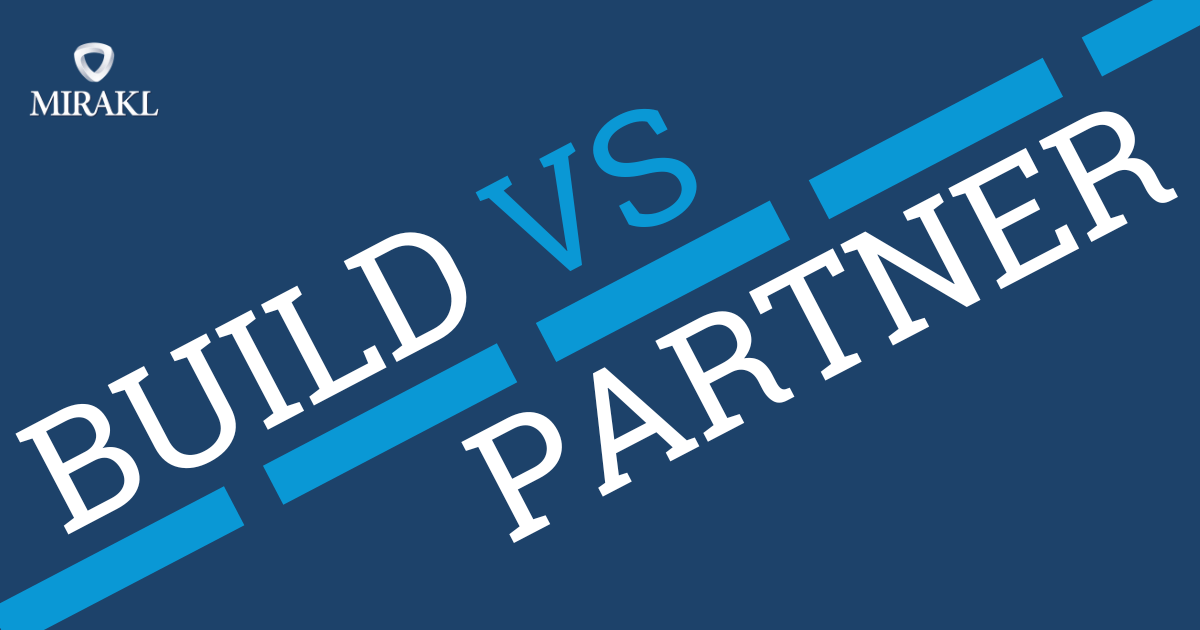Do It Yourself or Work With a Partner? Four Things to Consider When Building Your Online Marketplace

Marketplaces have consistently grown at double the rate of eCommerce, driven by buyers’ enthusiasm for the value and convenience that marketplaces offer. For consumer brands and B2B enterprises alike, participating in the marketplace economy is key to long-term success.
But choosing to launch a marketplace is the first step in a much bigger process. For the growing number of organizations across industries recognizing the power of the marketplace model, the question quickly becomes: how do you reach marketplace critical mass quickly, so you can reap all of the benefits?
As with many eCommerce initiatives, business leaders must choose between building their own proprietary, tailored solution or finding a technology partner to accelerate the process. In this article, we’ll take a look at four key factors that can determine the success of a new online marketplace: time to market, expertise, scalability, and cost & risk. In each case, the choice between building a new solution or partnering with a technology solution can have significant short-term and long-term impacts. We also share insights from Dvir Cohen, Chief Technology Officer at leading gifting platform Snappy, who revealed how Snappy’s decisions have impacted the growth of its business.
1. Accelerate time to market of your online marketplace
Retailers and their B2B counterparts do not have the luxury of time and patience in an increasingly competitive eCommerce era. While one brand deliberates on the best path forward, their competitors will have made decisive moves to adopt a new strategy, gaining crucial market share.
In order to accelerate time to market – and time to value – for a new marketplace, organizations must have a clear understanding of the capabilities they’ll need at launch. This includes connections and integrations with every part of your tech stack so that every aspect of the marketplace operates seamlessly, from order management to payment processing, customer support, and more. Without a high-quality product assortment, the marketplace will not attract new customers, so new marketplace operators must also have a strategy in place for recruiting and onboarding third-party sellers.
While businesses can develop individual plans for launching their own marketplace, partnering with consultants and technology providers brings a proven framework to the process. The marketplace operator is free to focus on the strategic value and insights that the marketplace brings to the business – accelerating time to market and achieving return on investment faster.
2. Knowledge & expertise to grow your online marketplace
Large-scale digital transformations need highly specialized talent. When organizations start a new initiative without having the right experts in place, they can quickly realize that they haven’t anticipated specific technical challenges. How will commissions be structured and managed? How will financials be reconciled between the organization and potentially hundreds of third-party sellers? How will existing processes and workflows be impacted?
Without extensive experience with these transitions, business leaders can overlook key details and run into costly stumbling blocks after launch. Bringing in expertise in marketplace technology and operations can help anticipate these hurdles before they become problems.
“As a technology-first company, we always consider building core technologies with our incredible team,” said Dvir Cohen, Chief Technology Officer, Snappy Gifts. “But we realized partnering with a proven solution would take our partnerships to the next level and help us scale an amazing experience for our customers. By partnering with Mirakl, we’ve been able to free up engineering resources and avoid mistakes along the way.”
3. Capture valuable data through your online marketplace
When an organization launches an online marketplace, their assortment can grows overnight from hundreds of first-party products to tens of thousands of items. This sudden scaling is the key advantage of the marketplace model. Not only can the operator offer more goods to their customers, but they can rely on their distributed network of sellers to handle the logistics. However, this expansion brings a new challenge. As soon as the marketplace is live, marketplace operators must be prepared to handle a sudden, exponential increase in first-party data. How will they ingest it, where will they store it, how will they harmonize data across first-party and third party products, and how will they analyze it to deliver key insights to the business?
“The data and statistics we are capturing through Mirakl has provided us the opportunity to innovate and create many automations,” said Cohen. “This has helped drive down our own SLA benchmarks and also improve our partners performance on a daily basis.“
Marketplace operators will also need to be prepared to manage both the seller and the customer experience. How will they communicate data-backed insights to their sellers? What tools will they use to manage returns and incidents? How will they manage taxes and payments?
Each of these questions represents a challenge that must be addressed before launching an enterprise marketplace. Technology partners offer the infrastructure needed to support key functions while also maintaining the flexibility to expand and ingest millions of new data inputs. Building a similar solution from scratch demands incredible amounts of engineering resources — time, talent and money.
“On average, we’ve been able to reduce the onboarding time by 3x, getting partners live & accepting orders within two weeks; previously it was upwards of 1+ months,” Cohen explained. “We’ve also been able to have as many partners as needed in the onboarding process, allowing our partnerships team to have zero limitations in signing the partners that will drive volume for our business. By doing this, we’ve expanded our partnerships by 300% compared to the pre-Mirakl solution.“
4. Reduce cost and risk by adopting a compliant online marketplace platform
Launching an enterprise marketplace touches every part of an organization. Once live, maintaining it requires more resources in both headcount and budget. Working with partners makes it possible to outsource the majority of the work needed to integrate and oversee the marketplace. Plus, technology providers like Mirakl are responsible for continual maintenance and enhancements, ensuring that your marketplace is always up-to-date from both a technology and regulatory standpoint.
“Now that Snappy has set up its core infrastructure, the product improvements Mirakl has scheduled for 2023 will help take our partnership to the next level,” said Cohen. “This will continue to support Snappy’s innovation efforts to provide a seamless experience for every user that touches Snappy, our partners, our clients, and our recipients.“
A marketplace platform is also invaluable for managing risk, particularly as more third-party sellers are onboarded onto a marketplace. Every third-party seller will reflect on the marketplace operator and its brand. Setting and maintaining clear quality standards ensures a strong, unified brand experience. Without the capabilities to manage this process at scale, marketplace operators must solve it on their own, introducing significant manual work for the business and potentially risking a carefully-protected brand.
These four factors illustrate the massive amount of resources needed to build an online marketplace from scratch and operate it entirely in-house. While some of the world’s largest organizations may have the money and talent to build their own solution, the process itself will still take months or years to complete — while competitors may have already raced ahead with marketplaces of their own.
The most effective and affordable way to launch a new marketplace is to do so with an experienced, knowledgeable technology partner. Enterprise marketplace experts like Mirakl are backed by learnings from launching and scaling 350+ marketplaces, across industries, globally. They can dramatically simplify and accelerate the development process while still offering the flexibility needed to tailor a solution to each operator’s individual needs.
Reach out to Mirakl’s marketplace experts today to learn how Mirakl can work for you.



